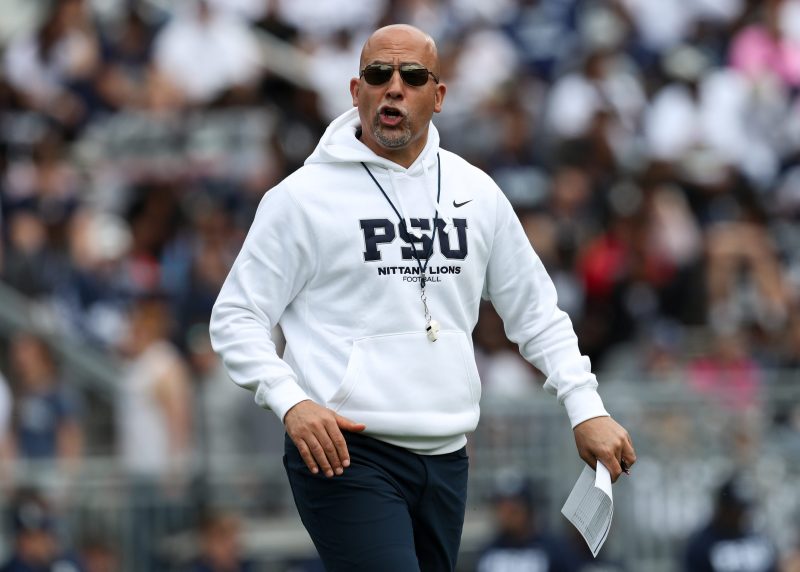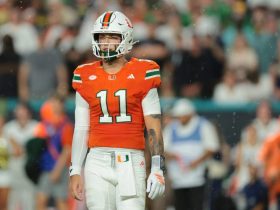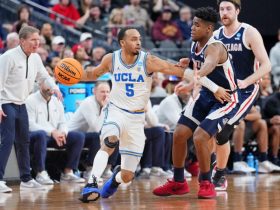Fully guaranteed contracts reward coaches who fail.
Oregon not a CFP lock after loss to Indiana.
If you predicted in August that Penn State’s James Franklin would be the next Big Ten coach fired after UCLA’s DeShaun Foster, I suggest you contact the feds and offer them your psychic services to help solve a few crimes.
Franklin beat Luke Fickell to the buyout bag, opening one of the Big Ten’s top jobs.
As the season hits its midpoint, the coaching carousel is already shifted into high gear. Give it a few more weeks, and it’ll be twirling at warp speed.
Here are some questions left on my mind after a seismic Week 7:
Where did Penn State go wrong with James Franklin?
Franklin’s losses to UCLA and Northwestern earned him a trip to buyout beach, where the drinks are paid for and the sun always shines.
Penn State owes Franklin a buyout topping $49 million, according to his term sheet, good for the second-largest severance pay day in college football history. That’s a sweet reward for losing to two unranked teams that were big underdogs in consecutive weeks, but that’s what happens when a school awards a coach a fully guaranteed contract.
Not accounting for bonuses, fully guaranteed contracts award a coach the same compensation whether he sizzles or fizzles.
So, why not fizzle, collect the failure money and head to a cush job with the ACC Network? That’s what Jimbo Fisher did. He owns the record for biggest buyout in college football history, topping $76 million.
What did Fisher and Franklin have in common?
Couple of things: They had Jimmy Sexton as their agent. Their contracts were fully guaranteed, meaning they’re owed their full compensation through the end of their contract term, so long as they’re not fired for cause.
The Aggies won no conference championships and made no playoff appearances with Fisher. Penn State won one conference title and made the playoff once in 12 seasons with Franklin.
After Franklin switched agents to Sexton, he received a 10-year contract extension in 2021 with his compensation fully guaranteed. Sandy Barbour was Penn State’s athletic director at the time. Interestingly, that deal came at a rocky point of Franklin’s tenure. He went 4-5 in 2020 and 7-6 in 2021 but nonetheless cashed in.
Penn State never released Franklin’s full contract. The term sheet it released does not address whether he has a duty to mitigate the damages.
Fisher’s first contract with Texas A&M was fully guaranteed. He left Florida State for the offer. He maintained a fully guaranteed deal after receiving a contract extension before the 2021 season that upped his salary and buyout. A little more than two years later, Texas A&M fired him.
Fisher did not have a duty to mitigate the damages, meaning he could collect his buyout and also cash checks from the ACC Network.
Awarding a coach a fully guaranteed contract with no duty to mitigate amounts to negotiation lunacy.
“Essentially, a coach could be owed $77 million, get fired not for cause, and the next day double dip and get another (lucrative) contract,” expert sports lawyer Martin Greenberg said to me recently, while discussing the phenomenon of fully guaranteed contracts, ‘which I find unbelievable and amazing and not something that colleges are going to be able to handle in the new era of revenue sharing and essentially pay-for-play.”
We’ll see about that last part. If revenue sharing with athletes and pay-for-play ends the practice of fully guaranteed contracts, that’s a worthy outcome.
Does Oregon need to win out to make College Football Playoff?
Maybe.
Think about it, Oregon’s best win came at Penn State, which subsequently lost to UCLA and Northwestern. The Ducks subsequently lost at home to Indiana, 30-20.
Oregon will be in fine shape with one loss. If the committee admitted one-loss Indiana last season, then it’s also going to admit one-loss Oregon.
But, what about if Oregon finishes 10-2, devoid of signature victories? That could leave the Ducks vulnerable, especially if Texas Tech and Miami each suffered a first loss in their respective conference championship game and nabbed at-large bids, turning the ACC and Big 12 into two-bid leagues.
Oregon’s remaining schedule features just one game against a ranked opponent, and are we sure Southern California is going to be ranked when that game is played on Nov. 22 in Eugene?
If the Ducks want to leave no doubt, they need to rip off six straight victories. The road begins this week at Rutgers.
Could Indiana earn a No. 1 playoff seed?
Yes. Why not?
The Hoosiers look legit, and their next six games are against unranked opponents. Take care of business, roll into the Big Ten championship undefeated, upset Ohio State and seize that No. 1 seed.
Crazier things have happened. Heck, a coach got fired nine months after coaching in a CFP semifinal.
Blake Toppmeyer is the USA TODAY Network’s senior national college football columnist. Email him at BToppmeyer@gannett.com and follow him on X @btoppmeyer.








